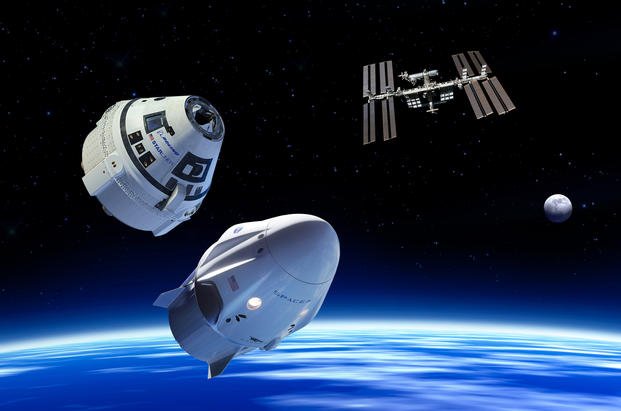A new report from a NASA watchdog says the U.S. is poised to spend $90 million per seat for flights on Boeing Co.'s CST-100 Starliner capsule, a price point much higher than NASA spends now using Russia's Soyuz spacecraft to ferry astronauts to and from the International Space Station (ISS).
Boeing, however, is pushing back on the report's findings, both on the per-seat cost estimates and other concerns.
The report, issued last week by NASA's Inspector General, states that, by comparison, the estimated average cost per seat is approximately $55 million for SpaceX's Dragon capsule, which is also a part of the Commercial Crew Program (CCP). The U.S. has spent between $21.3 million and $86 million for each round trip to transport astronauts via the Soyuz since the end of the Space Shuttle Program in 2011.
Responding to the report's cost estimates, SpaceX CEO Elon Musk tweeted that it doesn't "seem right" that Boeing is being paid more for the same service.
"Meaning [it's] not fair that Boeing gets so much more for the same thing," he said Thursday.
Related: Outgoing SecAF Worries About Developing Service Culture at New Space Force
Boeing issued a statement Monday responding to the IG's claims in detail. Regarding the per-seat cost estimate, the statement said Boeing offered the option of flying an additional passenger or more cargo capacity, at the direction of the customer.
"Boeing will fly the equivalent of a fifth passenger in cargo for NASA, so the per-seat pricing should be considered based on five seats rather than four," company officials said in the statement. "For proprietary, competitive reasons Boeing does not disclose specific pricing information, but we are confident our average seat pricing to NASA is below the figure cited."
Jim Chilton, vice president and general manager of Boeing Space and Launch, said in a statement that Boeing "[owed] it to the space community and the American public" to fact-check the Inspector General's claims.
"Each member of the Boeing team has a personal stake in the safety, quality and integrity of what we offer our customers, and since day one, the Starliner team has approached this program with a commitment to design, develop and launch a vehicle that we and NASA can be proud of," he added.
Chilton's reference to readiness is part of another allegation made by the IG. The report said there are "significant safety and technical challenges" within the parachutes, propulsion and launch abort systems in both the Starliner and the Dragon capsules, which will postpone some crucial milestone certifications for the program.
"The complexity of these issues has already caused at least a 2-year delay in both contractors' development, testing, and qualification schedules and may further delay certification of the launch vehicles by an additional year," the IG report said.
The initial crew demonstration flights are currently planned for early 2020, but "final vehicle certification for both contractors will likely be delayed at least until summer 2020 based on the number of ISS and CCP certification requirements that remain to be verified and validated," it said.
Boeing said it has made "excellent progress" on all outstanding technical challenges since the IG began collecting information for this report.
"We have retired nearly all possible risk ahead of our uncrewed and crewed flight tests," Boeing said. "We are confident that we have designed and built a safe, quality system that meets NASA's requirements."
The companies in 2014 were awarded fixed-price contracts: $4.2 billion for Boeing and $2.6 billion for SpaceX to certify their respective spacecraft by 2017.
The IG says NASA also overpaid Boeing just to fill the gap in mission sets.
"We found that NASA agreed to pay an additional $287.2 million above Boeing's fixed prices to mitigate a perceived 18-month gap in ISS flights anticipated in 2019 for the company's third through sixth crewed missions and to ensure the company continued as a second commercial crew provider," the report said. "For these four missions, NASA essentially paid Boeing higher prices to address a schedule slippage caused by Boeing's 13-month delay in completing the ISS Design Certification Review milestone."
In all, NASA could have saved millions by ordering only those first two missions -- three
and four -- while delaying orders for the subsequent missions, the IG concluded.
Boeing, meanwhile, said that these negotiations allow for more flexibility down the line.
"Through fair and open negotiations with NASA in a competitive environment, we offered single-mission pricing for post-certification missions (PCMs) 3-6, thus enabling additional flexibility and schedule resiliency to enhance future mission readiness," it said. "Contrary to the conclusion in the IG report, Boeing contends that the benefits in shorter lead time and flexibility in adjusting launch dates are well worth the higher price in the table."
-- Oriana Pawlyk can be reached at oriana.pawlyk@military.com. Follow her on Twitter at @Oriana0214.
Read more: 25 Years of Driving Without a License Comes to a Stop for German Man at Spangdahlem Gate












